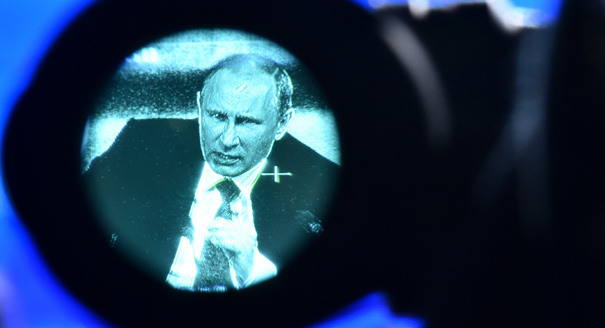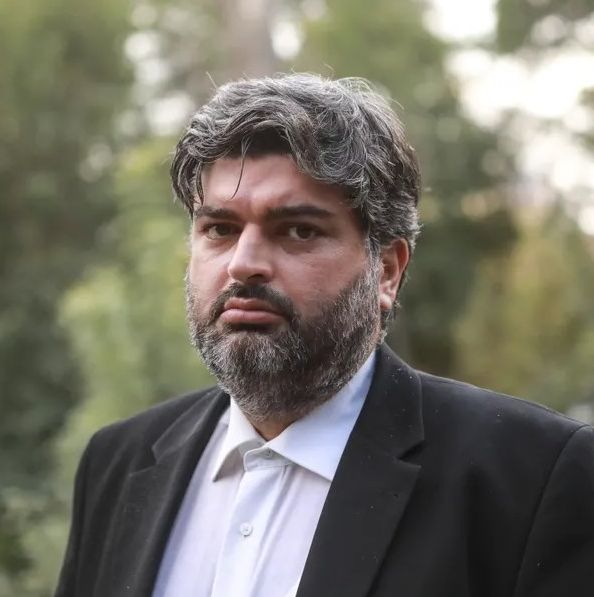Washington and New Delhi should be proud of their putative deal. But international politics isn’t the domain of unicorns and leprechauns, and collateral damage can’t simply be wished away.
Evan A. Feigenbaum
{
"authors": [
"Judy Dempsey"
],
"type": "legacyinthemedia",
"centerAffiliationAll": "",
"centers": [
"Carnegie Endowment for International Peace",
"Carnegie Europe"
],
"collections": [
"Europe’s Eastern Neighborhood"
],
"englishNewsletterAll": "",
"nonEnglishNewsletterAll": "",
"primaryCenter": "Carnegie Europe",
"programAffiliation": "",
"programs": [
"Europe"
],
"projects": [],
"regions": [
"Russia",
"Europe",
"Western Europe",
"Iran"
],
"topics": [
"Foreign Policy"
]
}
Source: Getty
Has Europe showed its weakness in the face of Russia’s aggressive policy in Ukraine? Is a weak Europe really in Russia’s best interests?
Source: New Eastern Europe
In fact, European countries do not share common positions over many issues. Why should Russia be any different? In fact, it is quite remarkable that EU member states have been united over continuing the sanctions on Russia. Yet this does not mean that they have a common position. A common position entails having a shared perception of the threat and having a shared perception of a strategy. When it comes to Russia, the member states lack both.
The northern countries, including the Baltic states and most of the Central and Eastern European countries certainly see Russia as a threat. But they cannot agree on how to counter that threat. The United Kingdom has recently adopted a much tougher stance towards the Russian president, Vladimir Putin, but the UK's threat perception is entirely different from states like Sweden or Poland. The southern countries understandably have a completely different perception of threats to them. These threats come from North Africa and the Middle East.Despite these differences there is one person that has been key to keeping the EU countries united over Russia – Angela Merkel, the German Chancellor. It is Merkel who has been driving the EU’s Russia policy, and it is Merkel who is in for the long haul over Russia – in other words, Putin. I do not see Merkel changing course as long as Putin is in power and as long as Russia continues to meddle in eastern Ukraine or elsewhere. The few tools at Merkel’s disposal are the EU’s soft power instruments, particularly sanctions. There is always the worry that some of the member states will wobble over Russia the longer the sanctions continue. Yet so far when it comes to sanctions the Europeans have maintained a common position towards Russia, largely thanks to Merkel.
This common position, however, is short term and not sustainable. It does not deal with the most important questions that the Europeans have so far avoided: what kind of security architecture do Europeans envisage now that Putin has torn up the elements of the Cold War and post-Cold War security structures? Do they really believe that the Organization for Security and Co-operation in Europe (OSCE) can be made to work or that some co-operative relationship between the West and Russia is still possible? Answering these questions requires a strong political will and staying power.
Germany’s Social Democrats and the older generation mentored by the former Free Democrat foreign minister Hans Dietrich Genscher still cling to the idea of Ostpolitik. That policy did serve some purpose during the Cold War, but the truth is Ostpolitik, particularly the strategy pursued by the former Social Democrat Chancellor Gerhard Schroder, has failed. The persistent German belief that trying to modernise the Russian economy could lead to a gradual political transformation of the country has not materialised. Russia under Putin rejected the partnership that it was offered by Germany, including Merkel. Thus, it is hard to see Merkel putting any offer back on the table.
Even if there was a sea-change in Russia, it is hard to imagine Germany under Merkel (or the Greens) reverting to the old German-Russian relationship. That relationship and strategy had two flaws. The first was that Russia could use Germany as its main ally in Europe. The second was that the policy did in some ways undermine the transatlantic relationship, which was of course Russia’s intention. It could then and continues now to tap into Germans’ ambiguous attitude towards the United States – and NATO. Because of its inability to influence real change in Russia, both Germany and its EU partners need to think long and hard about what kind of security strategy they need for and with Russia, which is also something that NATO has yet to consider. And it is something that the EU can no longer continue to ignore. Above all, it is a debate that Merkel has to start. However, I would not expect any common position with regards to this essential issue for some time to come.
The issue of the attractiveness of the European project is not so clear-cut. The European project is extremely unattractive for the leaders in Yerevan, Minsk and Baku. Until recently the European project for these leaders was an economically driven one. As long as the EU reduced trade tariffs and encouraged closer economic ties then the European project was indeed attractive. It became highly unattractive for the states’ leaders only after Viktor Yanukovych was chased out of the presidency of Ukraine in February 2014 and when supporters of the EuroMaidan movement decided that they wanted to be a part of Europe. The movement had had enough of failed revolutions and of their political elite playing lip-service to the EU or, worse, playing the EU against Russia. The civil society movements that sprung up over the past two years see what Europe stands for: the values of freedom, of a free media, of fair elections and accountability. Hence, the ousting of Yanukovych and the emergence of a civil society movement determined to change the status quo shook the leaders in Armenia, Azerbaijan and Belarus. They understood the attraction of the EU, which is why they themselves find the EU a highly unattractive project.
For the independent civil society movements across Eastern Europe, the European project is their attraction. Yes, the model is clumsy and bureaucratic, but the attraction is about how societies can be given space to develop and modernise and how state institutions should function and be made accountable. Yet for all the attractiveness of the European project for civil society movements and individuals in Eastern Europe, they are not naïve in assuming that the EU is their saviour. They are not naïve in assuming that the EU will embrace the spirit of enlargement that it did in 2004.
Instead, something is changing in civil society in Eastern Europe. This younger generation realise that they have to remake, or rather make politics. They have to complete the transformation of their own societies still locked in a kind of post-Soviet space and of the state institutions that stifle change that, after all, is their raison d’etre. The EU is not going to do this for them.
Indeed, the EU is very poor at state-building. Greece’s institutions, decades since it joined the EU, testify to this. So does the way in which the political elite in Moldova squandered EU goodwill and funds over the years, negatively affecting the public yearning to get closer to Europe. The constant infighting and corruption has given the EU a bad name in Moldova allowing pro-Russian political movements to exploit it while Moldova’s civil society is almost at a loss as to how to influence the elite. The EU, on the other hand, could do far more to sell itself to Eastern Europe. For all its staggering weaknesses, its inability to understand its own attractiveness is on the top of the list.
This assertion is true, but requires a big caveat. The last thing Russia wants is a strong Europe. A strong Europe means having a coherent and united foreign, security and defence policy. Europe lacks these three essential elements that would make Europe think and act strategically. Without them, Europe is weak. Europe has such a weak foreign, security and defence policy because the member states cannot agree on what these policies should mean in practice. These disagreements and the consequent weaknesses play into the hands of Russia. It has long been adept at playing off the member states against each other and exploiting the divisions.
Remarkably, the one area in which the EU has shown unity has been over imposing and prolonging sanctions on Russia. That actually took the Kremlin by surprise. It has since retaliated not only by banning certain food produce from EU countries but by embarking on an intense, extremely well-funded and organised propaganda campaign to discredit the West, particularly the United States, and to propagate a nasty anti-Ukraine campaign.
The Greek financial crisis – which is far from over – has also shown the inherent flaws in the EU’s common currency, particularly how the political out-weighed the economic, monetary and financial considerations when it came to admitting Greece into the Eurozone in 2001. But that is history. Europe has emerged weaker not stronger since the Greek crisis.
All the member states have tenaciously avoided the issue of what the Greek crisis really means. It is about the future of European political and economic integration. And it is the issue of integration, whether among the core Eurozone countries, or some kind of two-speed Europe, or among all 28 states (which is just so unthinkable given today’s political climate in Britain) that has to be addressed. Europe’s weakness is the blindness, or rather the persistence, of the states in putting their national interests before integration. It is the unwillingness by the elite to tackle the growing populism, the growing Euroscepticism and the growing hostility towards refugees and immigrants. The EU's weakness is about globalisation and all its concomitants: of the meteoric rise of digitalisation, of the demographic crisis facing nearly all EU member states, of what happens to the workplace as technology powers ahead and of the very important debate about inequality and opportunity.
Russia under Putin can well take heart that Europe is weak. But watch out Putin: a weak Europe is not to Russia’s advantage. Russia will have to embrace globalisation, and at the moment it is doing a very bad job of establishing a competitive, open economy based on rules. Putin’s political system and the structures of an economy that has failed to diversify cannot be sustained. Putting aside the demographic, social and environmental problems it already faces, Russia needs a strong Europe in order to modernise. China is certainly not going to help it to achieve that. In that sense, a strong Europe, not a weak one, might well be to Russia’s advantage, when it decides to look forward and not delve in the past.
This article was originally published in New Eastern Europe: On Conflict and Reconciliation.
Carnegie does not take institutional positions on public policy issues; the views represented herein are those of the author(s) and do not necessarily reflect the views of Carnegie, its staff, or its trustees.
Washington and New Delhi should be proud of their putative deal. But international politics isn’t the domain of unicorns and leprechauns, and collateral damage can’t simply be wished away.

Evan A. Feigenbaum
Senior climate, finance, and mobility experts discuss how the Fund for Responding to Loss and Damage could unlock financing for climate mobility.

Alejandro Martin Rodriguez
The EU lacks leadership and strategic planning in the South Caucasus, while the United States is leading the charge. To secure its geopolitical interests, Brussels must invest in new connectivity for the region.

Zaur Shiriyev
Instead of a guaranteed ally, the Kremlin now perceives Armenia as yet another hybrid battlefield where it is fighting the West.

Mikayel Zolyan
The uprisings showed that foreign military intervention rarely produced democratic breakthroughs.


Amr Hamzawy, Sarah Yerkes